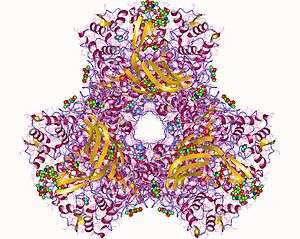Prophenoloxidase

Prophenoloxidase (proPO) is a modified form of the complement response found in some invertebrates, including insects, crabs and worms.[1]
A major innate defense system in invertebrates is the melanization of pathogens and damaged tissues. This important process is controlled by the enzyme phenoloxidase (PO).[2] The conversion of prophenoloxidase to the active form of the enzyme can be brought about by minuscule amounts of molecules such as lipopolysaccharide, peptidoglycan and beta-1,3-glucans from microorganisms.[3]
However it still has many arguments in it innate immune function, especially in model invertebrate animal.[4] The proPO homologous-protein in mammal also does not have any immune activity. Thus, it might be difficult to conclude its function in immunity.
References
- ↑ Beck, Gregory; Habicht, Gail S. (November 1996). "Immunity and the Invertebrates" (PDF). Scientific American. 275 (5): 60–66. doi:10.1038/scientificamerican1196-60.
- ↑ Cerenius, L; Söderhäll, K (2004). "The prophenoloxidase-activating system in invertebrates". Immunological reviews. 198: 116–26. PMID 15199959. doi:10.1111/j.0105-2896.2004.00116.x.
- ↑ Söderhäll, K; Cerenius, L (1998). "Role of the prophenoloxidase-activating system in invertebrate immunity". Current Opinion in Immunology. 10 (1): 23–8. PMID 9523106. doi:10.1016/S0952-7915(98)80026-5.
- ↑ Leclerc, V; Reichhart, JM (2006). "Prophenoloxidase activation is not required for survival to microbial infections in Drosophila". EMBO Rep. 7 (2): 231–5. PMC 1369246
 . PMID 16322759. doi:10.1038/sj.embor.7400592.
. PMID 16322759. doi:10.1038/sj.embor.7400592.